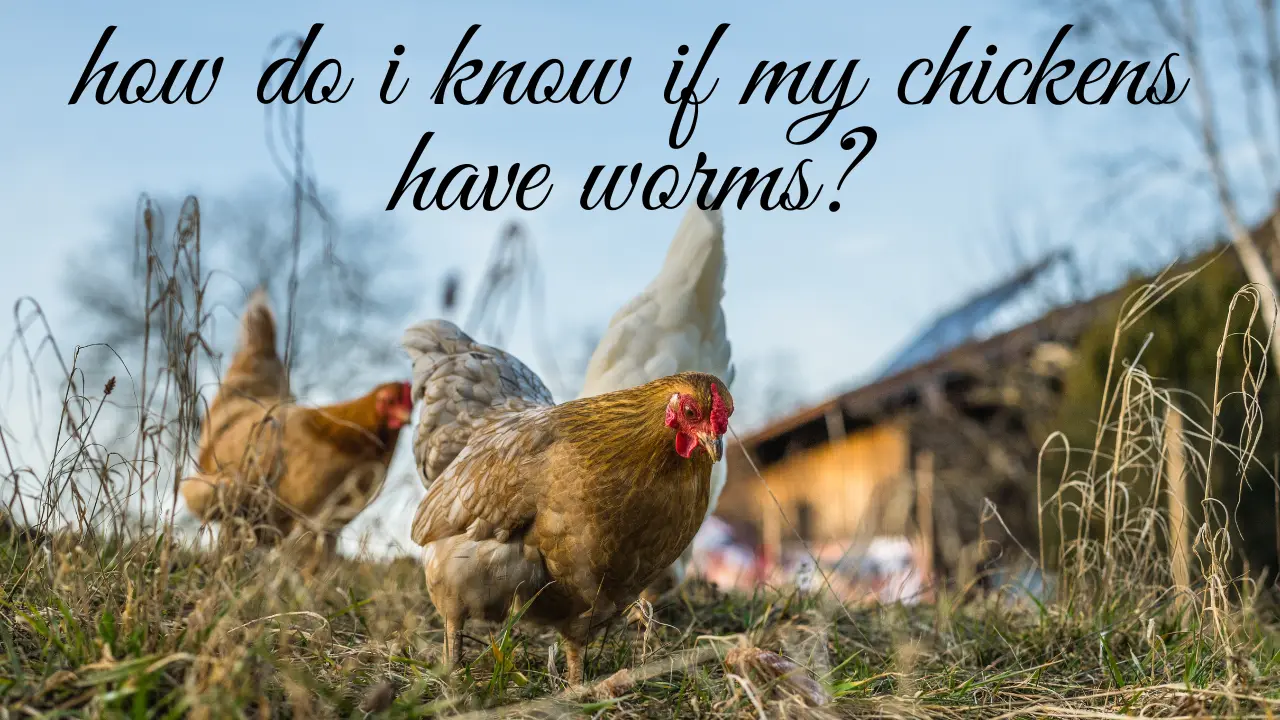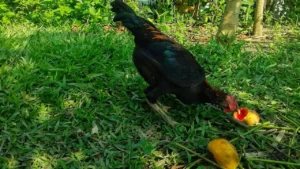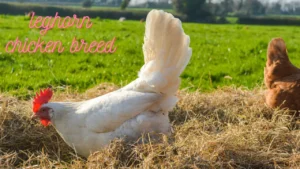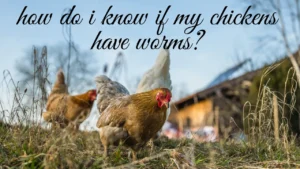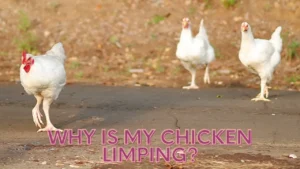Raising a healthy flock requires careful attention and one of the biggest challenges is dealing with worms. In my experience keeping backyard chickens may seem glamorous but today, I’ll share how these parasitical pests can affect your birds. Many poultry keepers talk about common problems but not everyone knows how to prevent or treat them. If your hens become infested they might show up as lethargic stop eating or struggle with a long-lasting outbreak. A well-monitored flock can avoid severe health risks but if you don’t act in time these parasites can harm your chickens.
Worms are a big concern in commercial farms but free range systems have a higher risk since fowls can scratch, peck, and ingest worm eggs from soil. The lifecycle continues when droppings spread the infection. Some of the most troubled types include roundworms, hairworms, tapeworms and caecal worms. These parasites can be directly or indirectly transmitted either through ingestion of earthworm hosts or worming contact with contaminated areas. To keep your flock safe regular cleaning and good husbandry methods are necessary. Moving birds to a new grazing area can help along with using an effective wormer when needed. With proper care and quick action you can intervene before a serious situation develops.
How Do Chickens Get Worms?
Keeping chickens healthy can be challenging especially when they pick up worms from their surroundings. These parasites can spread when birds eat worm-infected bugs worm eggs or larvae found in droppings or on the ground. A healthy bird may tolerate a few worms but if its immune system is down or stressed the parasite can populate quickly, leading to illness and even death. According to Omlet.us, the most common worms that infect chickens include caecal, gapeworm, gizzard worm, roundworm and tapeworms pretty unpleasant right? Yuck!
Worms are often transmitted through excreted faeces where other chickens may ingest them while they scratch and peck in their environment. Some worms spread through a host such as infected earthworms, ants, beetles, flies, slugs and snails. These parasites thrive in wet conditions, so even a spotless property can become a breeding ground after heavy rains.
Infestations can have a severe impact on breeders especially for growers in their early growth stages, typically between 3 months and 9 months old. Worms don’t always cause death but they steal essential nutrients decreasing immunity and making birds more vulnerable to secondary infections. If you notice slow growers or chickens that don’t seem 100%, worms could be the factor affecting their health.
Symptoms of Worms in My Chickens
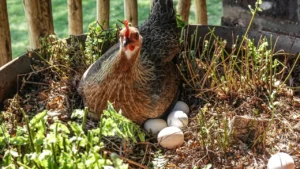
If your chicken is infested with worms you might notice unusual eating habits. At the front end they may eat more than usual, which can be deceiving because a healthy bird often eats a lot. However, an infected chicken is actually feeding the parasites inside its body. Over time, they become lethargic, hold their tail down and seem not interested in food.
Their combs and wattles may turn pale giving them a miserable look. Another clear sign is watery poop, loose droppings or even pale egg yolks. In severe cases they might quit laying eggs altogether. If you notice these symptoms, a vet can test for the type of worm you are dealing with and suggest how to treat it properly.
As the parasite spreads, the birds will lose weight or fail to put weight on, making them look poor in health. Anemia is common and recognizable by drooping, fading red combs and wattles. If the issue is gapeworm the chickens may have open beaks, appear to be gasping for breath and keep stretching their necks. Since unwanted lodgers like worms steal essential nutrients they weaken the chicken’s body leading to a worsening condition. Keeping a close eye on these warning signs can help prevent severe health problems in your flock.
Types of Worms
There are four common types of worms found in backyard chicken flocks especially in Australia. Along with these, some lesser-known culprits can also cause serious health issues. If your chickens have worms, I’d suggest the right treatment to buy and keep them healthy.
Caecal worm (Heterakis Gallinarum)
The presence of caecal worms in chickens is not always obvious, as they usually cause no symptoms or bad side effects. These worms live in the caecum of the chicken’s gut and follow a natural lifecycle meaning they don’t need a host like other parasites. They are small, white-ish and S-shaped growing up to ¾ inch or between 7mm and 1.5 cm long. Though generally harmless they can become a fatal condition for turkeys making them succumb to blackhead disease after eating caecal worm eggs. If problems occur especially in mixed flocks regular monitoring is essential.
Symptoms: Caecal worms can cause inflammation in the lower gut, leading to diarrhoea poor growth and depression in chickens. In some cases you may see worms in their faeces which is a clear indication of infection.
Treatment: Kilverm Poultry Wormer and Elanco Flubenol™ are effective treatments for worm infestations in chickens. These medications help control parasites and support poultry health.
Syngamus Trachea (Gapeworm Infection)
Gapeworm is a rare condition in chickens that mainly inhabit the trachea and lungs, making them short of breath. Infected birds may show signs like a gaping beak, neck-stretching and head-shaking, indicating a severe infection. These worms are red grow more than ¾ inch in length and often appear in pairs forming a Y shape.
Though some people have suspected cases this condition is exceedingly rare in Australia and even experienced avian vets have never seen it personally. In younger birds similar symptoms may be linked to Aspergillosis while in older ones, they can be attributed to respiratory diseases including bacterial or viral infections or issues like dust or ammonia exposure.
Treatment:Elanco Flubenol™ and Avitrol Plus Tablets are effective treatments for worm infestations in chickens.
Amidostomum Anseris (Gizzard Parasite)
Amidostomum Anseris, also known as the gizzard parasite, is uncommon in chickens, but it can still pose a threat, especially for those that live near geese. These parasites make their residence in the gizzards of birds and chickens that are infested may rapidly lose weight. Symptoms include being unwell with a hunched posture, sagging wings, and possibly diarrhoea. If left untreated the condition can lead to death.
To prevent infection, it’s important to keep the grass short, as UV light can help kill eggs. Rotating the ground and avoiding build-up in trampled muddy areas can also reduce the likelihood of these worms thriving. Although very rare in Australia, it is still something to keep an eye on especially in flocks that live near geese or are concerned about the possibility of infection.
Treatment: Elanco Flubenol™ and Avitrol Plus Tablets are effective treatments for worm infestations in chickens, helping to eliminate parasites and maintain poultry health.
Capillaria Worms (Hairworms or Threadworms)
There are two types of Capillaria worms: intestinal and crop. Intestinal threadworms follow a direct lifecycle, while crop threadworms have an indirect lifecycle that involves an intermediate host, such as earthworms. If your chickens are showing signs of illness, it’s important to check for these worms, as they can impact the digestive system and cause discomfort.
Symptoms: Chickens infected with Capillaria worms may show signs like diarrhoea, anorexia and poor growth. These birds often appear sickly, depressed and may have no breast fat making them look unwell.
Ascarida Galli (Roundworm Infection)
Ascarida Galli, also known as roundworm is the commonest type of nematode worms in chickens. These parasites live in the digestive system and can grow up to 8cm in length. Affected chickens may show symptoms like pale egg yolks and poor egg production which should prompt you to investigate further.
If left untreated these worms will eventually take over the chicken’s digestive and egg-laying systems. The worms can also be seen in the droppings of the infected bird and they are usually easy to deal with using a standard wormer.
Cestodes Family (Tapeworm Infection)
Tapeworms belong to the Cestodes family, and unlike nematode worms they are hard to spot. These intestinal parasites are typically 1/6 inch in length and can infect chickens through an intermediate host like a slug, snail or earthworm.
Infected birds may eat excessively but still lose weight and their egg-laying may be affected. Egg-infested droppings can spread the worm and the eggs can remain dormant in soiled ground for up to a year. If tapeworms are left untreated they can cause serious issues in the chicken’s digestive system.
Parasite Egg Count
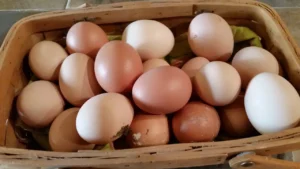
To check for worms in your chickens, you can use a shop-bought kit to collect samples and send them for analysis. The eggs are usually too small to be seen with the naked eye, so this method is helpful. It’s much cheaper than a trip to the vet. If the egg count is low the infection is mild and won’t have a detrimental effect on your birds.
Mild outbreaks of intestinal worms are common in life but you should investigate further if the situation worsens. This helps prevent worming treatments from being over-exposed which can make the worms drug-resistant.
Ways to Prevent Worm Infections in Chickens
To keep your chickens healthy and avoid worm infestations, it’s important to maintain a strong immune system in your flock. This can be done by using good coop hygiene, such as cleaning regularly keeping it fresh and dry, and preventing flies from spreading worm eggs. Implementing a deep litter method and performing a deep clean 2-3 times a year will help.
We also use Coop Recuperate to keep the coop smelling fresh and free from critters. It contains organic essential oils and diatomaceous earth which help eliminate harmful pests. Additionally make sure to sprinkle the product over muddy spots in the spring where worms tend to thrive. Free-ranging your chickens in a fenced-in run can further reduce the risk of parasite infestations by limiting their exposure to contaminated areas.
Treating Chickens Infected with Worms
If you suspect your chicken has worms, it’s important to be proactive about their health. I would recommend calling a vet if you feel your flock might be overrun by parasites. For treatment, you can use a dewormer but I prefer natural methods unless the situation calls for veterinary medicine. It’s best to seek advice from poultry nutritionists and vets, as they can provide expert opinions. If necessary use products like Strong Animals Chicken Essentials which offer valuable information, studies and effective treatments. If one chicken is infected, it’s crucial to separate them to prevent the spread of the worms and contact your vet for further advice.
FAQs
1. How do I know if my chicken has worms?
Look for signs like diarrhoea, poor growth and lethargy. Check for worms in their droppings or changes in egg production.
2. Can I treat my chickens for worms at home?
Yes, using a dewormer or natural treatments can help. Always ensure proper coop hygiene and monitor your chickens regularly.
3. What causes worms in chickens?
Chickens can get worms from contaminated food water or soil where worm eggs are present. Flies and other pests can also spread the infection.
4. How often should I deworm my chickens?
It’s best to deworm your chickens every 6 months or if you notice any symptoms. Always consult with a vet for proper scheduling.
5. What are the signs that worms are affecting my chickens?
Worms can lead to weight loss, poor egg production and visible changes in their feathers. Affected chickens may appear sickly or depressed.
Conclusion
In conclusion identifying whether your chickens have worms is essential for maintaining their health and well-being. Keep an eye out for signs like lethargy, poor egg production or changes in their droppings. Regular checks and maintaining proper coop hygiene can help prevent worm infestations. If you notice symptoms of worms, it’s important to act promptly and consult a vet for appropriate treatment options such as a dewormer or natural remedies. Early intervention ensures the long-term health of your flock and prevents the spread of parasites.
To keep your chickens free from worms regular preventative care is key. Implement practices like rotating their free-ranging areas cleaning their coop and using products like Coop Recuperate to help maintain a clean environment. By staying proactive and following proper poultry care you can effectively manage worm infestations and ensure your chickens thrive. Always consult with poultry nutritionists and vets for expert advice and tailored solutions.
